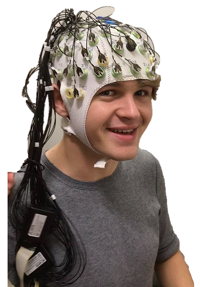The University of Exeter had the privilege of hosting a range of engaging activities during March for Brain Awareness Week.
Raising awareness of the importance of brain research and the progress that is being made, talks, quizzes and Q&A sessions were held across the week inviting students, staff and members of the public to get involved and find out more about the important research happening in Exeter and beyond.
Topics spanned a range of subjects from looking at the effects of sugar on our brains, to de-coding Alzheimer’s, to the latest genetic engineering advancements, plus much more.
As a self-classed ‘early bird’, I was particularly glad I made it to Dr Mino Belle’s evening talk ‘Our Daily Biological Clock’. Learning about our circadian rhythms and the effect our master clock has on our organs, memory, energy and sleep was a revelation. Discovering that you don’t have to get up at 4:00am in order to be a successful business kingpin was a huge relief (we all have our own individual peak performance times thankfully), and understanding how our evolving 24/7 lifestyles are disrupting our clocks was alarming, but also good to know what we can do to help realign our clocks and how researchers are studying this in-depth at present.
Another thought-provoking presentation came from Dr Jen Creaser, researcher within our QBME network, who gave an engrossing talk ‘Identifying Patient-Specific Brain Dynamics Markers in PTSD and CBT Response’. This explained her plans to use maths and psychology together to try and predict how successful cognitive behavioural therapy treatment will be on PTSD (post-traumatic stress disorder) patients.

CBT is a talking therapy that alters how you think and behave. It helps to reduce the PTSD symptoms and reverse the unhealthy increased brain activity that takes place when the patient is reminded about their trauma. Jen will utilise data from an EEG (electroencephalogram) device (pictured) which measures electric signals within the brain. EEG data captures healthy/unhealthy brain activity, provides information on which electrodes are talking to each other (and therefore which parts of the brain my be influencing each other), enabling her to identify unhealthy dynamic patterns. These patterns can then be captured and simulated in a computer using mathematical modelling, helping to predict the likelihood of CBT success, and eventually contributing to the development of patient-specific treatment plans.
This focus on personalised medicine is a huge growth area in healthcare, especially with advancements in genomics and bioinformatics. So, whilst there is still so much unknown about our most complex organ, it was fascinating and comforting to know that a huge amount of cutting-edge research is happening on our very doorstep.
If you missed out on this year’s events, put next year’s Brain Awareness Week in your diaries for 16 – 22 March 2020.
For information about donating your brain to science, check out the facts here.